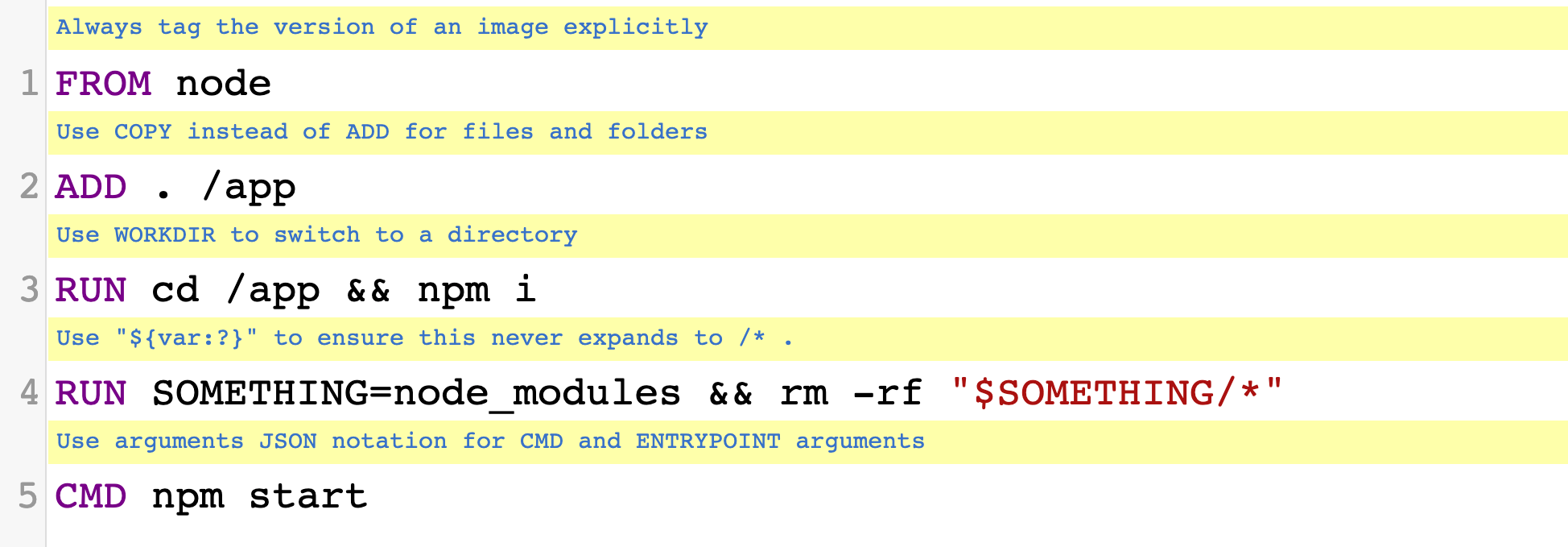hadolint/hadolint applies static code analysis by parsing the Dockerfile into an AST and performs/checks opinionated rules on top of that. By using koalaman/shellcheck, it’s also capable of linting Bash code inside RUN instructions in the Dockerfile.
The easiest way to run hadolint on most platforms is its online version or running it as Docker container by piping a Dockerfile to the docker run command as follows.
docker run --rm -i hadolint/hadolint < Dockerfile
Demo
To see what hadolint is capable of, let’s take the following very basic, straightforward Dockerfile as an example for giving hadolint a try.
FROM node
ADD . /app
RUN cd /app && npm i
RUN SOMETHING=node_modules && rm -rf "$SOMETHING/*"
CMD npm start
hadolint detects four potential improvements.

Dockerfile:1 DL3006 warning: Always tag the version of an image explicitly
Dockerfile:3 DL3020 error: Use COPY instead of ADD for files and folders
Dockerfile:5 DL3003 warning: Use WORKDIR to switch to a directory
Dockerfile:7 DL3059 info: Multiple consecutive `RUN` instructions. Consider consolidation.
Dockerfile:7 SC2115 warning: Use "${var:?}" to ensure this never expands to /* .
Dockerfile:9 DL3025 warning: Use arguments JSON notation for CMD and ENTRYPOINT arguments
Errors are clustered with the namespace key DL (= hadolint error) or SC (= ShellCheck error). All validated rules and practices are documented in detail in hadolint’s README as well as hadolint’s Wiki on GitHub.
Let’s adapt the suggestions and improve the Dockerfile accordingly.
FROM node:12
COPY . /app
WORKDIR /app
RUN npm i && \
SOMETHING=node_modules && \
rm -rf "${SOMETHING:?}/*"
CMD ["npm", "start"]
Configuration
In case you don’t agree with one or more of these opinionated rules, you can specify the ignored rules and trusted registries using a YAML configuration file called .hadolint.yaml.
ignored:
- DL3006
- DL3025
trustedRegistries:
- docker.io
Conclusion
If you’re having a Dockerfile in your repository, it’s highly recommended to include hadolint as a pre-commit hook or even better in your CI/CD pipeline, e.g. as follows for GitLab CI.
hadolint:
stage: lint
image: hadolint/hadolint:latest-debian
script:
- hadolint path/to/your/Dockerfile
In addition, there are also lots of editor integrations available which support in writing better Dockerfiles during development.